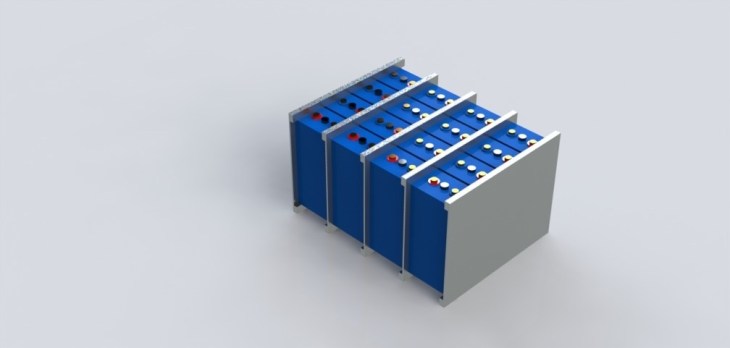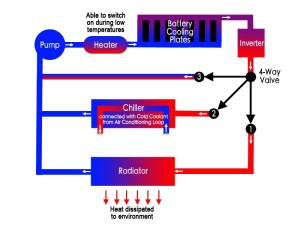A Singapore clean-tech company called Gcorelab has just received $482,000 (S$589,000) in funding for a new technology that promises to control the thermal issues that have plagued lithium-ion batteries.
Battery packs that use lithium-ion cells such as those found in laptops and, in larger deployments like electric cars, can suffer from cells failing. When the cells do and overheat, they can cause a chain reaction with neighboring cells, in a process known as thermal runway propagation, and this can lead to explosions.
Gcorelab has patented its cooling technology. It relies on cooling plates, and the team claims that its “oblique fin technology” can achieve 50 to 80 percent better results compared with liquid cooling, while using the same amount of energy.
Battery temperatures are managed by transferring heat away from components, and sensors help to regulate the cooling process, said Gcorelab co-founder, Ray Kung. It also works in cold climates, with heaters and coolers jumping in to keep things optimal, he added. (Batteries are finicky things; arctic temperatures can make them blow up, too.)
“Currently, battery thermal management is transitioning from air cooling to liquid cooling systems. While affordable and easy to implement, air cooling is vastly inferior in terms of heat transfer performance compared to liquid cooling,” said Kung.
So while the industry transitions to liquid cooling methods, Gcorelab is hoping its technology will provide a more affordable alternative to the latter.
If successful, the company’s technology could spell revolution for the battery industry and reliant industries, because of the cooling needed to prevent overheating and explosions.
Plenty of lithium-ion batteries have exploded over the years, from iPhones to electric toothbrushes. Bad enough to have something burst into flames while you’re brushing your teeth, but you can see why the airline and automotive industries are a lot antsier about safety standards regarding this.
Boeing’s brand new Dreamliner 787 planes recently suffered battery overheating faults, and regulators ordered all 50 planes to be grounded—the first US fleet grounding to happen in 34 years.
The grounding has reportedly cost Boeing an estimated $600 million, excluding other costs like compensation to airlines which have had business disrupted.
Tesla’s CEO, Elon Musk, has commented on Boeing’s battery woes. Musk’s diagnosis of Boeing’s design fault is that the 787 batteries have large cells placed close to each other. In order to minimize the cascading effects of thermal runway, Tesla cars use smaller battery cells with gaps between them, and tries to use better thermal insulation inbetween, he has said.
Gcorelab is working with a bus manufacturer in China, which it expects will be the biggest electric vehicle market globally in future. China has set a target to reach 5 million electric vehicles by 2020, to reduce its reliance on oil.
Gcorelab estimates this electric vehicle electronics cooling market to reach $5.7 billion a year by 2020. It also highlighted secondary markets that can be addressed such as cooling for wind turbines and aerospace uses, to be worth about $20 million in the same year.
The startup was founded in early 2011 by Lee Poh Seng and Kung. Lee has a PhD in mechanical engineering, and Kung has an MBA and functions as Gcorelab’s business development guy.
This round of seed funding came from Red Dot Ventures, one of the Singapore government’s appointed early-stage incubators. The government’s National Research Foundation (NRF) arm matches its incubators’ investments in the proportion of 85-15, providing a larger portion of the funding in order to boost seed funding amounts to startups in the country.

